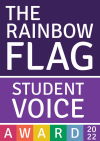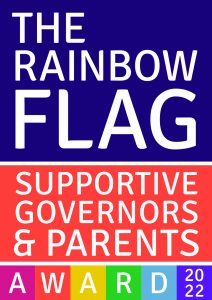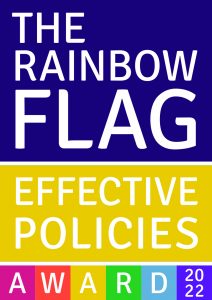We’re proud to say that the school has won a number of awards, listed below.




This award is a national quality assurance framework for all schools and colleges, focusing on LGBT+, (lesbian, gay, bisexual, trans, plus other related identities), inclusion and visibility. The Rainbow Flag Award encourages a whole organisation approach to LGBT+ inclusion, as well as developing strategies to combat HBTphobic bullying. (Homophobic, transphobic and biphopbic)
It is a commitment to improve the lives of all the young people that we work with, as well as the LGBT+ young people in our care, those from LGBT+ families, and LGBT+ staff members.
To achieve this, we have had to meet set standards in various areas, such as effective policies, skilled teachers and an inclusive curriculum as well as supportive governors.
To support Equality and diversity at Farney Close School we believe that all pupils and members of staff should have the opportunity to fulfil their potential whatever their background, identity and circumstances. We are committed to creating a community that recognises and celebrates difference within a culture of respect and co-operation. We appreciate that a culture which promotes equality will create a positive environment and a shared sense of belonging for all who work, learn and use the services of our school.
We recognise that equality will only be achieved by the whole school community working together – our pupils, staff, governors and parents/carers. We are also committed to responding to all diversity related legislation and feel that a single school equality scheme is the best mechanism for achieving this.
As well as delivering high quality services to its pupils, the school is also committed to being a good employer and as such this scheme outlines how we meet our varied duties in terms of recruitment and employment practices.
Principles To fulfil our legal obligations, we are guided by a number of principles:
- All pupils, families and staff are of equal value.
Therefore, we see all pupils, potential pupils, their parents and carers, and staff as of equal value:
o Whether or not they are disabled
o Whatever their ethnicity, culture, national origin or national status
o Whatever their gender and gender identity
o Whatever their religious and non-religious affiliation or faith background
o Whatever their sexual orientation
o Whatever their marital status
o Whether they are currently pregnant or have recently given birth
o Whatever their age
- We recognise and respect difference. We recognise that treating people equally does not necessarily involve treating them all the same. We recognise that our policies, procedures and activities must not discriminate but must take account of diversity and the kinds of barriers and disadvantage that staff, parents/carers or pupils may face in relation to their protected characteristics:
- We foster positive attitudes and relationships, and a shared sense of cohesion and belonging We actively promote positive attitudes and mutual respect between groups and communities different from each other.
- We observe good equalities practice in relation to staff We ensure that our policies and practices for all staff and potential staff throughout the employment lifecycle, i.e. from recruitment through to the end of employment and beyond, are applied fairly and consistently across all groups with full respect for legal rights, considering aspects applicable to particular groups (e.g. duty to make reasonable adjustments for disabled staff).
- We aim to reduce and remove inequalities and barriers that already exist. We ensure that policies and procedures benefit all employees and potential employees in all aspects of their work, including in recruitment and promotion, and in continuing professional development
- We consult and involve to ensure views are heard In our development of policies, we engage with groups and individuals, including pupils who are affected by a policy or activity to ensure that their views are taken into account. For policies and activities affecting pupils, we will take account of views expressed at school council; for parents, through parent governor representation and for staff, through staff governor representation. Where necessary, we will consult more widely with specific groups.
- We aim to foster greater community cohesion We intend that our policies, activities and curriculum offer foster greater social cohesion and provide for an equal opportunity to participate in public life irrespective of the protected characteristics of individuals and groups. We have a rolling programme for reviewing our school policies and their impact. We make regular assessments of pupils’ learning and use this information to track pupil progress. As part of this process, we regularly monitor achievement by ethnicity, gender and disability, to ensure that all groups of pupils are making the best possible progress, and take appropriate action to address any gaps.
Though perhaps the main benefit for the young people will be a dedicated pastoral support team.

Farney Close School was the first independent school to achieve the Healthy Schools Award, back in 2007. It covers four core themes that are particularly relevant to our work: PSHE (including drugs and sexual relationship education), Healthy Eating, Physical activity, and Emotional Health and Wellbeing (including bullying).

The Investor in Careers award recognises organisations that deliver the highest standards of careers education, information, advice and guidance (CEIAG). At the moment, the school is one of only 12 in West Sussex to achieve the award and only the second special school to do so in the region.

Loraine Rigglesford, our former Head of Maths, was nominated for the prestigious National Teacher Award and managed to attain a brilliant third place in the Special Educational Needs category. This is a real accolade for Loraine and we are very proud of her achievement!



